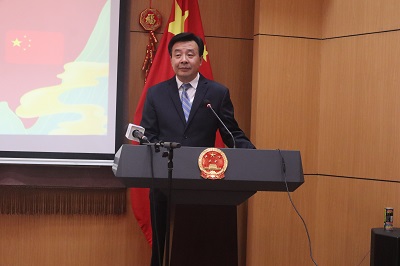By: Mpho Shelile
Maseru-The Embassy of the People’s Republic of China to the Kingdom of Lesotho last week Wednesday, celebrated the Chinese Lunar New Year, also known as the Spring Festival (Chunjie). Chinese Lunar New Year is one of the most significant and widely celebrated festivals in Chinese culture. It marks the beginning of the lunar calendar and is a time for family reunions, festive gatherings, and the welcoming of good fortune.
It is stated that for more than 3,000 years, Lunar New Year was just what it sounds like, the beginning of a new year in the Chinese calendar. The historic Chinese calendar is a lunisolar calendar, meaning dates are determined by both the moon (lunar) and the sun (solar). Months begin with every new moon, when the moon is not visible in the night sky. The New Year starts on the new moon is nearest to the midpoint, between the winter solstice and the spring equinox, sometime between January 21 and February 20. They also correspond to the cycle of 12 animals, the sequence of the animals in the Chinese tradition being the rat, ox, tiger, rabbit, dragon, snake, horses, sheep, monkey, roosters, dog and pig, such as this year of the dragon which begins and marks the end of the year of the Rabbit.
The Chinese Lunar New Year has a history spanning over 3,000 years, rooted in ancient agricultural practices and mythological beliefs. According to legend, the festival originated as a way to fend off the mythical beast Nian, who would terrorize villages during the winter. Firecrackers, loud noises, and the color red were believed to scare away the creature, laying the foundation for many customs observed during the festival.
The color red plays a prominent role in Chinese New Year celebrations, symbolizing luck and prosperity. Homes and streets are adorned with red lanterns, banners, and paper cutouts featuring auspicious symbols. Red envelopes, or “hongbao,” are given as gifts, usually containing money, to wish recipients good fortune and prosperity in the coming year.
As part of the celebration, there were activities such as Chinese chess, calligraphy, preparing traditional Chinese food, Chinese cultural dances performed by learners studying Chinese at Machabeng College, guessing lantern riddles, and Q&A sessions, also a lavish feast was prepared on the eve of the New Year, featuring traditional dishes with symbolic meaning; dumplings, fish, and sticky rice cakes are commonly enjoyed, each representing different wishes for the future, such as prosperity, unity, and longevity. Present at the event were Basotho youth, some of whom studied in China, some learning Chinese, members of the local media, and representatives from some political parties.
In his remarks His Excellency Ambassador Lei Kezhong stated that they plan to organize more gatherings and interactions like this one in the future between the embassy and Basotho youth in order to promote mutual understanding, cultural exchange, friendship, cooperation and provide support where it is needed
Ambassador Lei said that this year marks the 30th anniversary of the resumption of diplomatic relations between China and Lesotho, and the two sides are ready to work hand in hand as a new starting point to further upgrade bilateral relations, expand practical cooperation areas, and attain countless developments of China-Lesotho friendly cooperative relations.
“Ten years on, Belt and Road cooperation has extended from the Eurasian continent to Africa and Latin America, and expended from physical connectivity to institutional connectivity and people to people bonds. It has created the largest platform for international cooperation with the broadest coverage in the world. A good example being the Mpiti-Selabatebi Road which is currently under framework,” he said.
Ambassador Lei indicated that last year the 10th anniversary of the Belt and Road Initiative (BRI) and vision of a community with shared future for mankind put forth by President Xi Jinping. He said they want to build an open, inclusive, clean beautiful world of lasting peace, universal security and shared prosperity. “China and Lesotho have maintained friendly and cooperation relations for over three decades, our relations are based on the principle of equality, mutual respect, non-interference in each other’s internal affairs,” he said. Further stated that China and Lesotho have a sound cooperation in infrastructure, agriculture, food security, renewable energy, scholarships, capacity building and trade (98% zero tariff).
Ambassador Lei stated that the Chinese Lunar New Year is not just a time of celebration but also a reflection of their rich cultural heritage and enduring traditions of the Chinese people. Adding that it is a time to honor ancestors, strengthen family bonds, and welcome the coming year with hope and positivity. “As the world joins in celebrating this auspicious occasion, the Chinese Lunar New Year continues to be a symbol of unity, joy, and an enduring spirit of a vibrant culture which we are eager to celebrate with the youth of Basotho and Basotho in general.”


